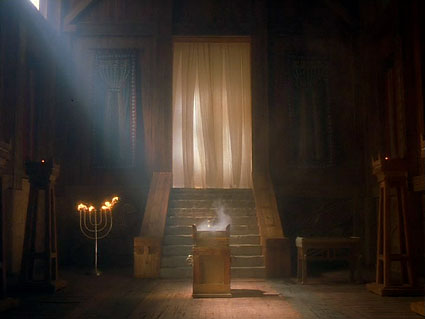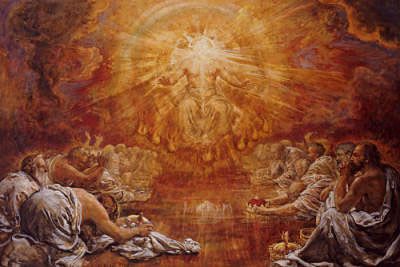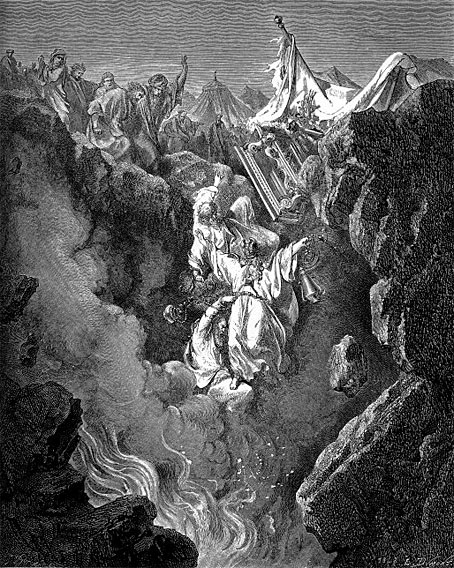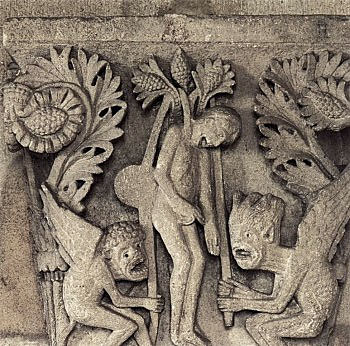Jul
24
2009

Time for another weird post I think. Here’s some thoughts on Genesis 2:
“This at last is bone of my bones and flesh of my flesh;
she shall be called Woman, because she was taken out of Man.”
Why the change from Adam and Eve to Ish and Isha? Perhaps because the words are symbolic, and symbols describe relationships.[1] There is the possibility that these words were used because they sound like eish (fire), regardless of their differing derivations (the jury is still out on this one after 6000 years). Jordan mentions that Adam was to be an Altar made of earth, and with his own blood shed comes the “fire” of Isha, the woman as the shining on the altar, the glory cloud on Mount Sinai. It certainly corresponds with the feasts. Adam “ascends” to headship over Eve in marriage (Firstfruits), and then he is to “open the Law” to Eve and fill her with light (Pentecost), which he did, but failed to repeat the Law (Trumpets) after she was tested. Atonement followed.
Continue reading
2 comments | tags: AD70, Adam, breastplate, Eve, Feasts, Genesis, Greater Eve, Incense Altar, Lampstand, Man of sin, Scavengers, Tabernacle, Temple | posted in Biblical Theology
Jul
21
2009
or Cutting Off the Generations of the Wicked

O daughter of Babylon, who are to be destroyed, Happy the one who repays you as you have served us! Happy the one who takes and dashes your little ones against the rock!
(Psalm 137:8-9)
A further comment on Psalm 137 (following Church and State and Liturgy as Prophecy):
The church has the power to excommunicate, but the state alone has the power to execute. In Joshua’s and David’s time, church and state were one, thus Israel’s army slaughtered God’s enemies judicially. In Mordecai’s time, the slaughter of Haman’s followers by the Jews occurred only after church and state became one under Mordecai’s new executive power.
You must be logged in to see the rest of this post.
Join now for a year for $15!
As an advisor to the state, the church gives the word, and offers the sacraments, but it is always the state that carries out the judgment — government. The state is the “outer court” into which the living sword-water flows. Some taste life and others taste death. [1]
Continue reading
Comments Off | tags: AD70, Babylon, Joshua, Mordecai, Nebuchadnezzar, Psalms, Zedekiah | posted in Biblical Theology, The Last Days, The Restoration Era, Totus Christus
Jul
17
2009
or Global Warning

An important tenet of James Jordan’s interpretation of the Revelation is that it shows the Old Covenant angelic government vacating the premises and a human government moving in as a new administration – in AD70. This sounds strange to our ears, but I have found that it does play out in many ways, which it should if it is the correct interpretation.
Now, this handover of heavenly government was a gradual process in the first century, but consummated at the marriage feast of the Lamb. But its outworking in history is gradual. Interesting stuff. Here’s some thoughts.
Continue reading
Comments Off | tags: AD70, Angels, Demons, Nazirite, Peter Leithart, Revelation | posted in Against Hyperpreterism, Biblical Theology, Quotes, The Last Days
Jun
29
2009
James Jordan’s work on the Jew-Gentile oikoumene set up in Daniel has far reaching implications.1 Peter Leithart writes:
“Yoder argues that from the time of the Babylonian captivity, the Jews developed a proto-”free church” model of community life. True in some respects. Jews didn’t have their own polity. But I’ve got doubts if that’s a fair characterization of Jews in and after the exile.
Continue reading
Comments Off | tags: AD70, Archaeology, Daniel, Esther, Exile, Hellenism, Mordecai, Nehemiah, oikoumene, Peter Leithart, Tertullian, Yoder | posted in Biblical Theology, Quotes, The Last Days, The Restoration Era
Jun
25
2009
 “Let no one deceive you by any means; for that Day will not come unless the falling away comes first, and the man of sin is revealed, the son of perdition.” (2 Thessalonians 2:3)
“Let no one deceive you by any means; for that Day will not come unless the falling away comes first, and the man of sin is revealed, the son of perdition.” (2 Thessalonians 2:3)
Non-dispensationalists are often accused of “Replacement Theology,” that is, the church replaced Israel. But we find in the Old Testament many examples of the same process prefiguring what the people of God went through in the first century. It is not replacement, but transformation.
Continue reading
Comments Off | tags: Aaron, AD70, Caleb, Ezra, James Jordan, Judaisers, Korah, Moses | posted in Biblical Theology, Quotes, The Last Days
Jun
23
2009
The serpent poured water like a river out of his mouth after the woman, to sweep her away with a flood. But the [Land] came to the help of the woman, and the [Land] opened its mouth and swallowed the river that the dragon had poured from his mouth. (Revelation 12:15-17)
 Satan mimicked the expanding gospel dominion with counterfeits at every step. Here, not only did he forge the water chariots of the true Temple (a false baptism), he would bring Noahic “rest” to the Land by destroying God’s mighty men. He would bring about his own twisted “new earth” by deluging the church with bogus teaching.
Satan mimicked the expanding gospel dominion with counterfeits at every step. Here, not only did he forge the water chariots of the true Temple (a false baptism), he would bring Noahic “rest” to the Land by destroying God’s mighty men. He would bring about his own twisted “new earth” by deluging the church with bogus teaching.
Continue reading
Comments Off | tags: AD70, Esau, Herod, Judas, Korah, Numbers 5, Satan, Scavengers, Temple | posted in Biblical Theology, The Last Days, Totus Christus
May
12
2009

“And in that day His feet will stand on the Mount of Olives, which faces Jerusalem on the east. And the Mount of Olives shall be split in two, from east to west, making a very large valley; Half of the mountain shall move toward the north and half of it toward the south.” Zechariah 14:4
Surprising as His ways are, the Lord always follows procedure. Like Ahasuerus in the book of Esther, anything that is done is done by decree. Although, in the case of Ahasuerus, he needed to consult his elders, whereas God only consults his maturing elders (like Abraham and David–and now the church) to bring us to greater maturity.
A decree is written in the Most Holy, the king’s garden court (head). The elders in the Holy Place respond with liturgy (body). And then they ride out into the world on the swiftest horses to incite a Holy War that divides the world to bring about a New Creation.
Continue reading
Comments Off | tags: AD70, Ahasuerus, David, Esther, Greek philosophy, Liturgy, Numbers 5, Remnant, Restoration, Solomon, Temple, Zechariah | posted in Biblical Theology, The Last Days, The Restoration Era
Apr
24
2009
“Now if anyone builds on this foundation with gold, silver, precious stones, wood, hay, straw, each one’s work will become clear; for the Day will declare it, because it will be revealed by fire; and the fire will test each one’s work, of what sort it is. If anyone’s work which he has built on it endures, he will receive a reward. If anyone’s work is burned, he will suffer loss; but he himself will be saved, yet so as through fire. Do you not know that you are the temple of God and that the Spirit of God dwells in you? If anyone defiles the temple of God, God will destroy him. For the temple of God is holy, which temple you are.” (1 Cor. 3:12-17)
Are the gold, silver and precious stones our heavenly bling? From the structure of this passage, I think what Paul is referring to is the church. If we are building disciples who remain despite trials and testing from God, we will be rewarded. The immediate context of this is the false doctrine of Judaisers, and their house of gold, silver and precious stones (Herod’s Temple and his puppet High Priest’s robes). While Paul was building a Temple out of people, Herod was busy polishing the brass on the Titanic that he knew Jesus had said would be submerged under a Gentile flood (Daniel 9:26). Herod’s precious stones didn’t make it through God’s judgment. The Day declared what it was in truth.
The question is, are our disciples a robe/house for Jesus, or are they kindling in His nostrils? When He comes to judge, what will our ministry be revealed as?
Comments Off | tags: AD70, Daniel, Herod, High Priest, Holy Spirit, Judaisers, Paul, Temple, The flood | posted in Biblical Theology, The Last Days
Apr
19
2009
or The Feasts are the Key to the Revelation
All Christians recognise Christ’s fulfilment of Passover (crucifixion) and Firstfruits (ascension), followed by Pentecost. Futurists, who major on all things Jewish, recognise that Trumpets and Atonement follow, but they push them into the future.
Continue reading
Comments Off | tags: Acts, AD70, Against Hyperpreterism, Atonement, Dispensationalism, Herod, Holy war, Jezebel, Passover, Totus Christus, Trumpets | posted in Against Hyperpreterism, Biblical Theology, The Last Days
Apr
18
2009
or A Marriage Made in…
The Bible is big on mediators. Adam’s role as faithful Showbread would link heaven and earth. He would be a god-man. Fulfilled by Christ, this is the liturgical role of a minister. He faces God as representative of the Bride, and faces the church as the representative of the Bridegroom. He is Solomon at the completion of the Temple dedication.
The ‘hell’ hybrids are the Land-beasts of the Bible. This is what Adam became, conspiring with Satan. It was an unholy alliance between God’s mediator and the Creation, in which the Creation called the agenda. The resulting peoples are hunters like Nimrod and Esau, wolves instead of shepherds, bloodthirsty children of the daughters of men.
Continue reading
Comments Off | tags: 666, AD70, Adam, Boaz, Compromise, Crystal Sea, Dominion Theology, Esther, Herod, Intermarriage, Joseph, Nero, Nimrod, Paul, Pilate, Revelation, Solomon, Table of Showbread, Temple, Totus Christus, Wormwood | posted in Biblical Theology, The Last Days































